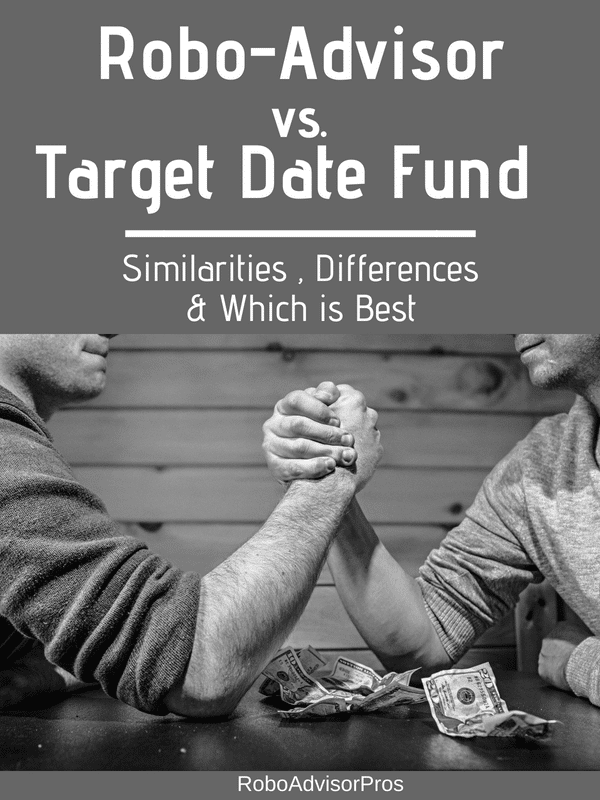In the wake of the amazing technological improvements impacting investing opportunities, you might find yourself torn between two investment approaches. If you’re wondering “what’s the difference between a robo-advisor and a target date fund,” you’ve come to the right place.
How Does a Target Date Fund Work?
The target date fund was created for your retirement. The concept is an all-in-one mutual fund portfolio designed as a set-it-and-forget-it investment plan.
The investments include diversified stock and bond index mutual funds.
This retirement fund must be able to be partially cashed out by your preferred date and should be geared toward getting you to your investment goals by that date. You’ll notice that your fund allocations shift over the years.
[toc]
*Disclosure: Please note that this article may contain affiliate links which means that – at zero cost to you – I might earn a commission if you sign up or buy through the affiliate link.
The asset allocation, or percent allotted to each mutual fund is more aggressive the future you are from retirement. That means there’ll be a greater proportion of stock mutual funds initially. As the retirement date approaches the investment mix becomes more conservative with a greater allotment to bond mutual funds.
The reason for this glide path is that stocks typically offer higher returns than bonds, albeit with greater volatility.
You’ll typically find this option in your 401k retirement plan. The dates typically range from 2045 for someone expecting to retire in several decades to a 2030 fund for someone expecting to retire within the next five to ten years.
Most financial companies offer target date funds.
For example, the low-cost Vanguard Target Retirement 2045 Fund (VTIVX), has the following 90% stock mutual funds and 10% bond index funds asset allocation in 2021:
| Fund | Percent Allocation |
| Vanguard Total Stock Market Index Fund | 53.50% |
| Vanguard Total International Stock Market Index Fund | 36.00% |
| Vanguard Total Bond Market II Index Fund | 7.40% |
| Vanguard Total International Bond Index Fund | 3.10% |
As time passes and 2045 approaches, the asset allocation will transition s to the asset mix of the 2025 mutual fund. The 2025 option currently has a 35% stock mutual fund and 65% bond mutual fund asset allocation.
How Does a Robo-Advisor Work?
Robo-advisors are computer or algorithm-based investment platforms that are designed to replace traditional financial planners.
The investor takes a quick quiz, which assesses the user’s timeline, financial goals, and risk tolerance.
Next, the platform will recommend an asset allocation of low fee index funds, in line with the investor’s goals and preferences.
All robo-advisors rebalance the funds back to your preferred asset allocation regularly.
While others offer:
- Tax-loss harvesting
- Financial advisors
- Actively managed investment strategies
- Passive index fund investing
- Low-cost ETFs
- Low minimums
- Socially responsible options
- And more
There are so many robo-advisors out there that you’re bound to find one that fits your needs, whether you’re already a retiree or are looking for low-fee investing options.

One massive boon to robo-advisors is that they are extremely customizable.
There are many hybrid robo-advisors that also offer human financial consultants.
Although some robo-advisors are good at specific things, like making investments for women or helping new investors get started, others can be tweaked so that they handle multiple investing goals (retirement and a child’s college fund, for example).
In fact, M1 Finance combines DIY investing with robo-advisor management.
Beginner Robo-Advisors
What’s the Difference Between a Robo-Advisor and a Target Date Fund?
There are a few similarities between robo-advisors and target date funds that make each alternative a good investment choice for certain groups of people. However, there are some stark differences that are worth noting before you dive into one or the other.
Investments and Customizability
Target date funds do adjust to reflect your progress toward your goals—sort of.
When accounting for things like life expectancy and specific date-based goals, robo-advisors do a bit better.
Robo-advisors are a clear winner if you want flexibility.
Because target date funds are designed with specific years as end goals, they’re a bit less you-focused than a robo-advisor can be. They have blanket investing asset allocations designed to meet the average investor’s goals by a specific end date. And within the broad target date fund universe, the investment expense ratios and asset allocation assumptions vary.
For example, one target date fund might have an asset allocation of 50% stocks and 50% bonds at your retirement date. While another might have you at 60% stocks and 40% at your retirement date. This matters as stocks are more volatile than bond investments and their values bounce around more. So, if you’re looking to tap your investment money at age 65, you want to make certain that the asset allocation at that point is in line with your risk tolerance.
Most robo-advisors allow you to shift your asset allocation at will. So, if the risk level of your robo-advisor investments isn’t working for you anymore, you can just change it.
Both robo-advisors and target date funds can provide diverse investment portfolios. And you’ll need to check under the hood to uncover the available investments within each offer.
In general, you’ll find greater investment diversity within the robo-advisor universe.
All robos offer basic stock and bond funds. While some robos veer into real estate, commodities, and value investing stock funds. Others give you the chance to invest in a wide range of bond varieties. Also, robo-advisors take your risk tolerance into consideration and can be adjusted as you go.
Our robo-advisor quiz enables sorting based upon number of investments. This is a great feature if you’re looking for access to a more widely diversified portfolio.
Learn more; Robo-Advisor Comparison Chart
Fees
Both options have one important thing in common: they’re both usually cheaper than a traditional financial advisor.
Traditional human investment advisors typically charge 1.0% or more of assets under management (AUM).
Robo-advisor management expense ratios range from zero at SoFi Invest, M1 Finance, and Schwab Intelligent Portfolios on up to 0.89% for the nearly full-service automated investment platform at Personal Capital.
Both robo-advisors and target date funds run almost autonomously. Robo-advisors rely on algorithms to calculate and rebalance your portfolios, while target date funds have pre-scheduled rebalancing options to make sure your investments become less aggressive (thus more reliable, in theory!) over time.
With target date funds, there are typically no overarching management fees, but you’ll need to pay attention to the underlying fund management fees, which can be high. While Vanguard offers low fee funds in their offers, other providers might include fund options with higher expense ratios.
Meanwhile, nearly all robo-advisors fund offers include low-fee exchange traded funds (ETFs).
Best; Free Robo-Advisors
When you pay a traditional financial advisor, you are paying for all sorts of things: salaries as well as the brick-and-mortar building and all its utilities, for instance. Algorithm-based online investment platforms don’t have all these fees, so they are more economical.
Historically Proven Success
This is one category where target date funds jump ahead. Simply put, they have been around longer than robo-advisors. For that reason, target date funds have some historical weight behind them.
Although nothing is ever guaranteed when you make an investment, it is comforting to see that these retirement products have been working for many people over the years. Robo-advisors, on the other hand, are relatively new. Although these robo investing has also had success and are doing great at this moment, the market is always unpredictable.
Further, bothchoices invest in publicly available mutual funds and ETFs, and so you can rest assured that the funds are highly regulated with long term track records.
Still, just because something is new doesn’t mean you should stay away from it. Robo-advisors are consistently proving themselves as serious contenders in the investment market. Actually, both Betterment and Wealthfront have crossed the 10-year mark.
Target Date Fund – Pros and Cons
Pros
- Easy to purchase
- Doesn’t require your oversight, once you invest, you’re done
- Good 401k option
- Sufficient diversification
Cons
- Might include high fee mutual funds
- No financial planning options
- Typically limited to stock and bond index funds, lack diversified asset classes
- Can’t adjust the asset allocation
Robo Advisor Pros and Cons
Pros
- Wide universe of strategies and investment options
- Investment planners available on some platforms
- Incorporates users risk tolerance
Cons
- Typically, unavailable in 401k retirement plans (Blooom is the exception)
- In most cases, can’t choose your own investments (M1 is an exception)
The Takeaway: Should I Choose a Robo-Advisor or a Target Date Fund?
Let’s recap: robo-advisors and target date funds each offer benefits that can help you reach your long-term goals. Which one you choose depends on what you value most in an investment platform.
Are you looking for a longer history of success, one-time setup, and an investment option that needs no maintenance? You might try a target date fund.
Do you value the ability to “set it and forget it,” while still having the option to adjust your investments at any time? A robo-advisor might be your best choice.
Would you like to stay away from the high fees that most traditional financial advisors charge? Either a option would be a good choice for you!
This doesn’t necessarily need to be a question of choosing one over the other. A good portfolio is generally one that is well-rounded and diverse, so investors may choose to complement their retirement savings with investments in both.
You might consider a target date fund in your 401k and a robo platform in your taxable investment brokerage account.
As with all choice there are disadvantages of robo-advisors and target funds, as well as advantages of each.
However, if you need to choose just one you should choose the option that best represents your values and needs, whether those needs are a low-maintenance investment option, increased customizability, or ease of access.
Related
- 5 Best Robo-Advisors for Beginners
- How do Robo-Advisors Work?
- Robo-Advisors with Low Investment Minimums
Disclosure: Please note that this article may contain affiliate links which means that – at zero cost to you – I might earn a commission if you sign up or buy through the affiliate link. That said, I never recommend anything I don’t believe is valuable




